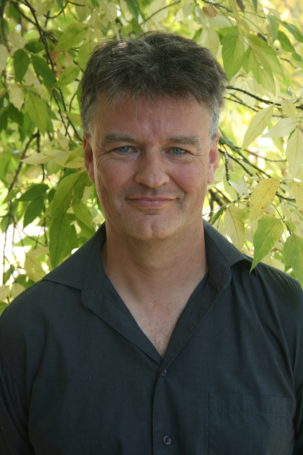May 14, 2021
Poet, novelist, and nonfiction writer Tim Bowling left the West Coast to forge a successful writing career in Edmonton
Few of us are lucky enough to have narrowed down our career paths by the time we’re adults, but Tim Bowling had it figured out by Grade 1. He knew, for sure, that he wanted to become a writer — and he did.
“It’s a complete mystery because no one in the family had any history of this at all,” he says. The West Coast native grew up in Ladner, B.C., a a small town on the banks of the Fraser River estuary where many folks — his father included — worked as salmon fishermen. His mother stayed home to care for the couple’s four children, the oldest two being near adults by the time their youngest sibling was born. Bowling’s third sibling was a sister four years older who liked to read to him, which fostered an early interest in reading that may have spawned a fascination with writing.
Whatever the reason for his literary ambitions, Bowling made a beeline to the University of British Columbia after high school to earn a BA in English. Afterward, he returned home and, while continuing to write, made a living fishing with his older brother. “But it wasn’t looking like a great future,” he says. At 30, Bowling moved to Edmonton to be with the woman who would become his wife (then a PhD student at the University of Alberta) and earn an MA in English.

Edmonton was not at all what Bowling had anticipated. “When I moved here in 1995, I was surprised that the arts scene was very culturally developed, mature, and well-funded,” he says. Although it didn’t have the “sexy, global” reputation of Vancouver, Edmonton had a lot to offer its artists and was eminently more livable. This is still the case today, says Bowling: “It’s a better place to be a writer.”
Over the last 26 years, Bowling has written 13 collections of poetry, two nonfiction works, and five novels that that explore universal themes while often focusing on aspects of life in Western Canada. These works have received numerous awards and recognitions over the years, including two of his poetry collections (The Witness Ghost and The Memory Orchard) that were finalists for the Governor General’s Award, his novel The Paperboy’s Winter that won the Georges Bugnet Award, and his novel The Tinsmith, a finalist for the Rogers Writers’ Trust Fiction Prize.
In 2008, he earned a fellowship from the John Simon Guggenheim Memorial Foundation in recognition of his entire body of work. On top of these accomplishments and others, Bowling contributes to the city’s writing community as a mentor, writer-in-residence, and sessional instructor in literature and creative writing.
“He’s an Edmonton treasure,” says local author and journalist Curtis Gillespie, who has known Bowling for 25 years and nominated him for this year’s Edmonton Artists Trust Fund (EATF) awards. A collaboration between Edmonton Community Foundation and the Edmonton Arts Council, the annual awards are given to a handful of accomplished creative professionals to encourage them to continue making art in Edmonton.
“It’s really meaningful and important for people who choose to stay in Edmonton and forge a career here,” says Gillespie, who earned the award himself years ago. “It’s not the easiest thing for a freelancer — for someone without a salary somewhere — so it’s an important award.” With an accomplished and diverse literary career, Bowling is a deserving recipient of the award, says Gillespie: “He’s achieved so much: The awards he’s won, the places he’s published, the diversity of work.” Even so, he describes Bowling as “radically underrecognized” and hopes the award helps to change this.
Bowling says the award will allow him to make progress on his latest manuscript, a nonfiction book about superhero culture. However, the award’s value isn’t simply financial. For Bowling, knowing his colleagues in the arts community believe in him is “a huge boost, psychologically, and very motivating.”
Learn more about the EATF